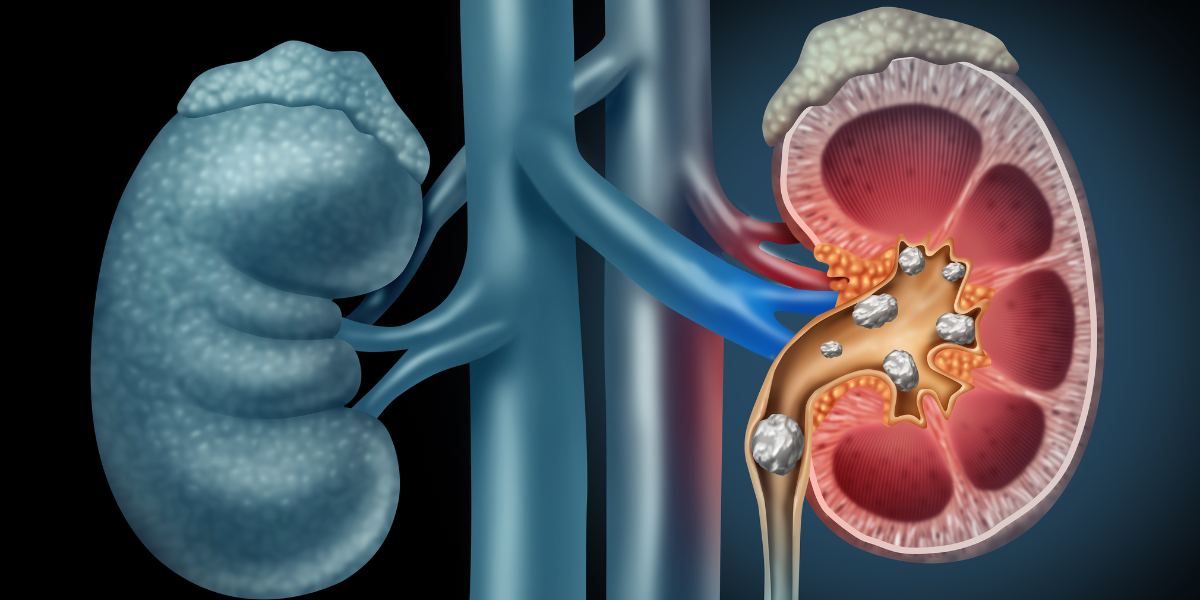


Kidney stones have become one of the more common conditions in this current time period. More than 500,000 people visit emergency rooms each year due to kidney stones. In the US, one in eleven people suffers from kidney stones. The risk of getting them is about 11% in men and 9% in women. Various illnesses that may raise the risk of having kidney stones include high blood pressure, diabetes, and obesity.
Kidney stones, also known as renal calculi, are composed of minerals and salts that develop within the kidneys. They can also develop anywhere along your urinary tract, including the kidneys, ureters, bladder, and urethra. Kidney stones pain can be severe if left untreated and can lead to other issues.
There are four types of kidney stones which include:
These are the most common types of kidney stones. Calcium stones are often created from calcium oxalate, though they may consist of calcium phosphate or maleate. These stones may form if your intake of calcium and fluids is inadequate.
This is the second most common type of kidney stone. This type of stone forms when the urine becomes overly acidic. They can occur in individuals who have gout, diabetes, obesity, or another type of metabolic syndrome.
These stones are less common and are caused due to infections in the upper urinary tracts. These stones are commonly found in people with urinary tract infections (UTIs) and can cause urinary obstruction due to being large in size.
These are the rarest type of kidney stones that can occur in 1 out of 7,000 people worldwide. These stones can occur in people suffering from a genetic disorder called cystinuria. Cystine, a naturally occurring acid in the body, seeps from the kidneys into the urine in this form of stone.
A kidney stone does not generally cause symptoms until it travels about within the kidney or enters one of the ureters (tubes connecting the kidneys and bladder). If a kidney stone gets stuck in the ureters, it can block the flow of urine and cause the kidney to enlarge and the ureter to spasm, both of which can be quite painful. You may, at that point, experience the following symptoms:
Kidney stones don’t have a definite, singular cause and are generally influenced by a combination of several factors. Possible factors include:
A medical history evaluation, physical examination, and imaging tests are used to diagnose a kidney stone. The specialist will use a high-resolution CT scan to know the specific size and shape of the kidney stone.
Next, the health of your kidneys will be diagnosed by the specialist with various blood tests and urine tests. When doing this, your health and the size and location of your stone will also be taken into consideration.
Lastly, the specialist will analyze the stone to find the cause of it after it comes out of your body. For this, your blood or urine will be tested for calcium, phosphorus, and uric acid.
Your kidney stone treatment will be tailored according to the type of stones you have. But the most common treatment for kidney stones is drinking six to eight glasses of water daily to increase the urine flow. Other treatment methods include:
Several medications like allopurinol, thiazide, sodium citrate, phosphorus, naproxen, etc., are used to treat pain, infection, and causes of kidney stones.
Extracorporeal shock wave lithotripsy employs sound waves to break up big kidney stones, allowing them to move more easily through the ureters and into the bladder. This process can be uncomfortable and can cause bruising on the abdomen and back.
Your chronic kidney stones will be removed by a surgeon through a small cut in your back. This procedure is needed when the stone causes obstruction and infection, has grown too big, and if the pain is intolerable.
Although dealing with kidney stones can be an unpleasant and frustrating experience, numerous treatment options are available for you. In reality, several treatments and medications are available to assist control symptoms and encourage kidney stone transit. Additionally, staying hydrated and adopting dietary modifications can help prevent kidney stones from developing in the long run.
If you are looking for the best kidney stone treatment in Indianapolis, IN, then contact us at Kidney Physicians of Indiana right now. We are one of the best nephrology clinics in Indianapolis. Our board-certified nephrology physicians specialize in diagnosing and treating various kidney diseases.